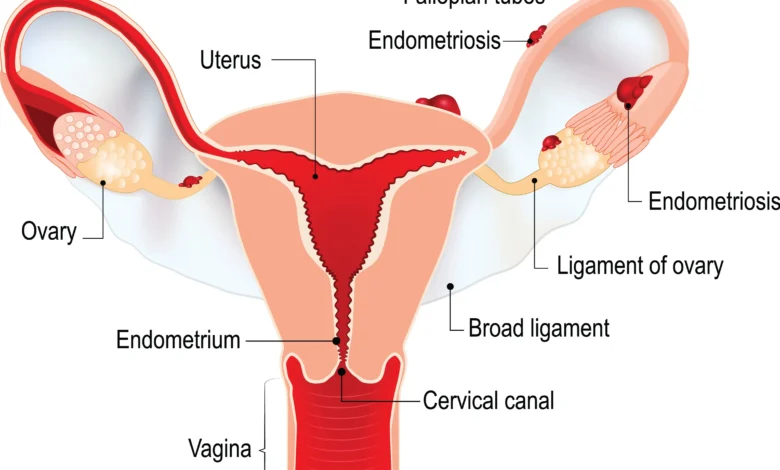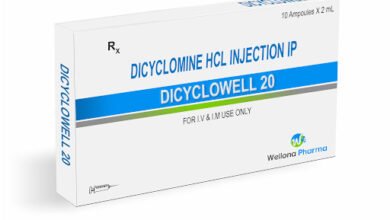Self Care Tips to Manage Endometriosis

Endometriosis (en-doe-me-tree-O-sis) is one of the most common conditions which usually affects 190 million women worldwide. It is a condition when uterine blood lining, which typically grows inside the uterus starts growing outside the uterus. It can cause various symptoms such as pain during and after sex, excessive bleeding during periods, irritation or may develop scar tissues in the affected area. Sometimes, women may also experience infertility issues.
“Endometriosis is typically hard to diagnose because it shows symptoms to various parts of the body”, said by Karli Goldstein, MD, board certified minimally invasive gynecologic surgeon in New York.
The persistent challenges of dealing with endometriosis may take a toll on women’s health. Here we have compiled a list of some self care tips to manage endometriosis.
It is important to diagnose and get proper treatment to manage the condition. But, you should take care of yourself and get rid of the condition.
Along with the treatment, you can try below mentioned self care tips to ease the condition. So, let’s start!
Start taking a balanced diet
A healthy and balanced diet rich in fiber and antioxidants is proven to provide relief from the painful symptoms of endometriosis. It is also suggested to take additional supplements such as Vitamins C, D and E. According to a research published in February 2023, you should include foods such as dark leafy vegetables, broccoli, beans, nuts, salmon fish, oranges, berries, dark chocolate, avocados, olive oil etc to get relief from pain and inflammation.
To maintain a balanced diet, it is important to avoid such foods which may cause irritation or interrupt with the condition such as processed foods, red meat, alcohol, caffeine, saturated and trans fat etc.
Do mild exercise
When you are in pain, you may not feel comfortable enough to do exercise or work out but it is suggested to do work out for at least 30 minutes a day. There’s research which also proves that the women who exercise regularly reported less pain and inflammation.
Warm Bath
Taking a warm bath and placing heat pads around the abdominal area may provide you relief from the intense pain and inflammation of the endometriosis. This is one of the most commonly followed self care techniques to get relief from the pain for the women with endometriosis.
Acupuncture
Acupuncture is also considered as one of the widely used self care techniques to combat the pain and inflammation associated with endometriosis. This is a form of chinese treatment, when a practitioner injects small needles to the specific part of the body to maintain the blood flow and ease the endometriosis symptoms such as pain, itching and cramps.
Herbal Supplements
Endometriosis is linked with estrogen levels. To manage the estrogen levels in the women’s body, there are some herbal remedies you can use to support your gynecological treatment and get more optimal results. Some common herbal supplements are circumin, pine bark extract, chamomile, peppermint, vitex, and ashwagandha etc. These herbal supplements are clinically proven to provide relief from the endometriosis symptoms.
Good Night Sleep
According to research, women who are suffering from endometriosis are likely to get more tired and may feel more sleepy compared to those who don’t have the condition. Here are some tips to give you a good night’s sleep suggested by the Centers for disease control and prevention,
-
You should go to bed at a fixed time for better sleep.
-
For better sleep, make sure your bedroom is quiet and dark.
-
Avoid using mobile phones or any devices just before bedtime.
-
Avoid consuming caffeine based beverages before you sleep.
-
Avoid large meals or alcoholic beverages close to bedtime.
It is also recommended to take a lavender bath with warm water that may also help you have a relaxed night and help you sleep better.
Track your periods
During endometriosis, you may feel more pain and excessive bleeding during your periods. It is better to track your periods and manage your calendar so that you can get an idea when you are going to experience the worst pain of endometriosis. Tracking your periods is also a great way to deal with the endometriosis symptoms in your hectic lifestyles.
Take proper care for your mental health
If you’re dealing with ongoing pain, it can make you feel down and anxious. Mental well-being is linked to physical comfort, especially for women with endometriosis facing challenges like difficulty getting pregnant. Consider having a behavioral health psychologist on your endometriosis care team. They can teach you stress management techniques like deep breathing and mindfulness. Trying meditation might also help with depression related to chronic pain. If needed, ask your doctor about antidepressants, keeping in mind that some endometriosis medications with hormones might impact your mood. Prioritize your mental health to enhance overall well-being while managing endometriosis.
Over-the-Counter Medicines
Pain relief for endometriosis can be from both prescribed and store-bought medicines. Sometimes, regular pain relievers may not be strong enough for serious endometriosis pain. Talk to your doctor about what’s best for you based on how you feel.
The usual medicines for endometriosis pain are called NSAIDs (like ibuprofen, aspirin, and naproxen). They work by stopping certain compounds in your body that cause pain, swelling, and trouble during periods.
Here’s the trick: To make NSAIDs work best, take them about 1 to 2 days before you usually start feeling pain. If your periods aren’t on a regular schedule, your doctor might suggest taking the medicine for the whole week before your period.
Different people respond to different medicines. Your doctor might suggest trying various NSAIDs or a mix of them with other treatments. Always check with your doctor before trying any new medicine.
Communicate openly with your partner
Endometriosis pain is worse during and after sex which can impact your relationship. It is advisable to openly communicate with your partner about your condition and you both can also consult a sexual therapist to discuss how to help your partner understand your condition and how to relax if you get anxious about sex.
Wrapping Up
In summary, managing endometriosis involves simple steps that put you in control. Eating well, exercising, and enjoying warm baths bring relief. Acupuncture and herbal supplements, like chamomile or peppermint, can help too. Tracking your periods and caring for your mental health are key. Openly communicating with your partner is essential, especially when dealing with pain during and after sex. By combining these easy practices with medical advice, you empower yourself against endometriosis. With these steps, you take charge of your well-being, paving the way for a more comfortable and hopeful future.
Frequently Asked Questions
What are the most common symptoms of endometriosis?
The most common condition of endometriosis is pelvic pain, pain during and after sex, painful periods.
Is endometriosis a curable condition?
Endometriosis is not a curable condition but it can be managed with various techniques.
What are the main causes of endometriosis?
The main causes of endometriosis are not fully understood, but factors like genetic predisposition and retrograde menstruation are considered potential contributors.
Is endometriosis a life threatening condition?
Endometriosis is not typically a life-threatening condition; however, it can significantly impact quality of life.
Can I get pregnant with endometriosis?
While endometriosis may affect fertility, many women with the condition can conceive with medical assistance or intervention.
Source link
#Care #Tips #Manage #Endometriosis



